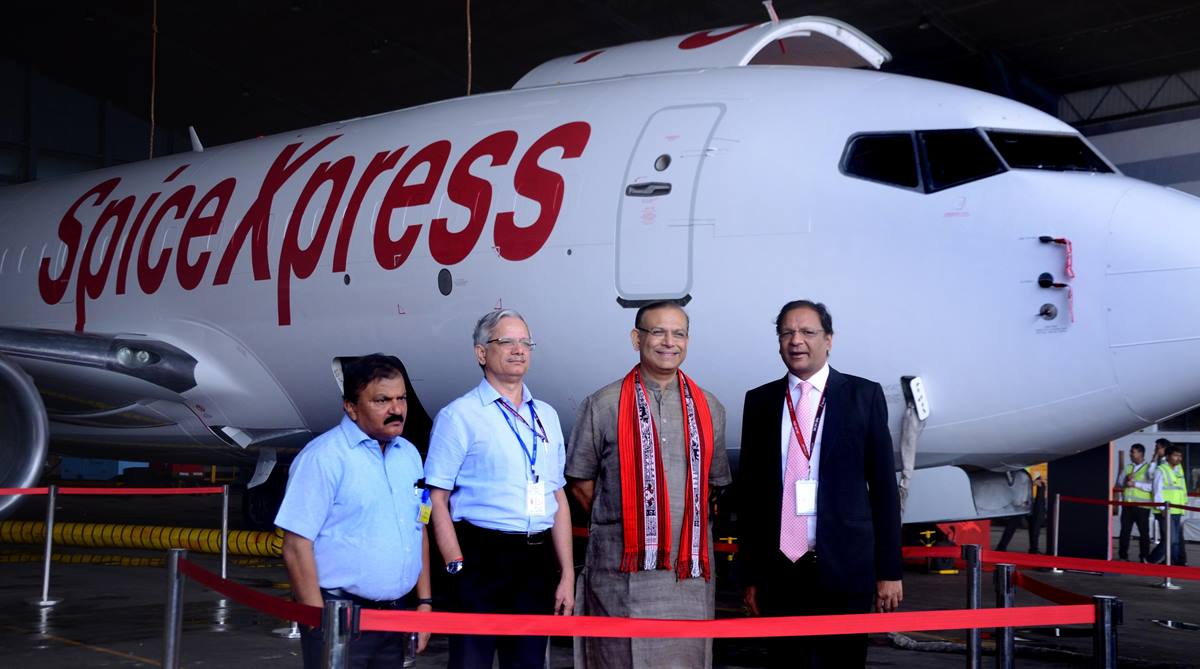BJP issues show cause notice to Jayant Sinha for not taking interest in poll campaign
The notice issued by BJP's Jharkhand general secretary Aditya Sahu said that Sinha's conduct has maligned the party image.
According to the company, the current cargo capacity of SpiceJet’s existing fleet is about 500 tonnes per day. With the addition of four freighters by March 2019, this capacity is expected to go up to 900 tonne a day in a phased manner.

MoS, Civil Aviation, Jayant Sinha and CMD, SpiceJet, Ajay Singh along with Guruprasad Mohapatra and RN Choubey, at the unveiling of of the first SpiceJet freighter aircraft at Terminal 2, Indira Gandhi International Airport, in New Delhi on 10 September. (SNS Photo: Subrata Dutta)
Budget airline SpiceJet inducted the first freighter aircraft in its fleet on Monday and announced the launch of its dedicated air cargo services. The company has created a separate division, “SpiceXpress”, which will start operations on September 18, 2018.
“We are very confident that there is a significant space for dedicated air freighter in the Indian market. The economy is growing at 8 per cent and we are having an e-commerce boom in this country,” SpiceJet’s Chairman and Managing Director Ajay Singh told reporters in new Delhi at the induction of the freighter aircraft, a Boeing 737-700.
Advertisement
“In our cargo network we have tied up close to 1,800 companies. There is no shortage of demand… We are adding four aircraft, this is first one we will be adding another three…,” he added.
Advertisement
READ | Flights are cheaper than auto-rickshaw ride in India, claims Jayant Sinha
The country has only five freighter aircraft at present while the air cargo traffic in India is expected to grow by 60 per cent in the next five years, according to industry experts.
“The freighter aircraft will be acquired on pure operating leases and haven’t incurred any major CAPEX, while the ground operations will be either self-handled by the existing Spicejet ground infrastructure or shall be outsourced till we develop a certain scale of operations,” he said.
According to the company, the current cargo capacity of SpiceJet’s existing fleet is about 500 tonnes per day. With the addition of four freighters by March 2019, this capacity is expected to go up to 900 tonne a day in a phased manner.
SpiceJet currently offers cargo services on its passenger aircraft fleet numbering 36 Boeing-737s and 22 Bombardier Q400s that it operates across 47 domestic and seven international destinations.
“The added capacities through the acquisition of the freighters will enhance the airline’s existing cargo competence to 60 domestic destinations by the end of this year. SpiceJet aims to further ramp up this competence servicing up to 150 destinations across India, Asia and Europe by 2022,” the airline said in a statement.
It added: “The service will address time and temperature sensitive shipments across verticals, like letters and credit cards under banking; ad blood, organs and medicines under pharma. Other shipments would include automobiles, apparel, consumer electronics, e-commerce and live animals.”
The airline will also ship perishables like farm fresh fruits and vegetables to the Middle East.
The development comes at a time when the Central government is preparing a multi-modal Cargo Policy. Minister of State for Civil Aviation Jayant Sinha was present at the unveiling event of the first SpiceJet freighter aircraft at Terminal 2 of the Indira Gandhi International Airport in New Delhi on Monday.
Advertisement